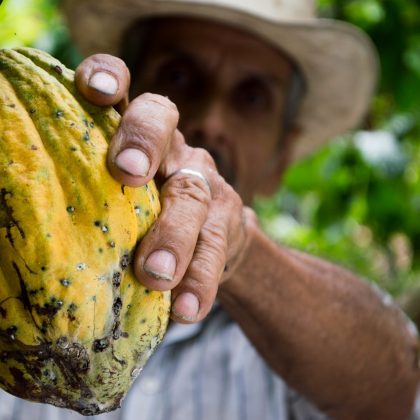Sweet Profits, Bitter Truth
As the sun sets over the vast cocoa plantations of Côte d’Ivoire and Ghana, the hardworking farmers who tend to the crops are left in the dark shadows of poverty and inequality. These farmers are paid a pittance for their back-breaking work, struggling to make ends meet while the chocolate industry reaps enormous profits. Cocoa farmers earn as little as $1.20 per day, yet the global chocolate market generated $131.9 billion in revenue in 2021 and is projected to grow 4.50% annually. The 2022 State of Treating reports that despite a difficult year for the consumer goods and retail industries, chocolate and candy sales have remained strong. During the Easter season alone, confectionery sales reach approximately $4 billion in the United States of America.
For decades, farmers have endured the bitter reality of low wages, human rights abuses, structural poverty and exploitative working conditions, while the profits of the chocolate industry soar to new heights. But now a movement for change is sweeping across the region, as these farmers demand better pay and respect for their basic human rights. Representatives of farmers from Ghana and Côte d’Ivoire, two of the world’s largest producers of cocoa boycotted a partnership meeting convened by the World Cocoa Foundation which represents 80% of the global cocoa market. Authorities in Ghana and Côte d’Ivoire accuse multinational chocolate companies of hindering efforts to increase cocoa farmers’ earnings. The countries are specifically concerned with the Living Income Differential (LID) – an additional charge of $400 per tonne on top of world prices, intended to set a standard income level and alleviate poverty among farmers.
In a move that sent ripples across the global chocolate industry, this new approach forwards the struggles for better pay by farmers. This is a powerful reminder that human rights must be at the forefront of all business operations particularly as the World Cocoa Conference releases dates for the next meeting to be held in Amsterdam in 2024.
Slave Wages and Corporate Power
Côte d’Ivoire and Ghana are two of the world’s largest producers of cocoa, producing over 60% of the world’s cocoa. However, despite the importance of cocoa to the economies of these two West African nations, the vast majority of farmers in both countries are small-holder producers who struggle to live a dignified life. According to a report by the Fairtrade Foundation, the price of cocoa has fallen to levels not seen since the 1970s, despite rising demand for chocolate and other cocoa products.
One of the main reasons for the low incomes of cocoa farmers in Côte d’Ivoire and Ghana is the low prices that they receive for their produce. This has often been attributed to a variety of reasons such as oversupply, lack of collective bargaining power, change in consumer preferences and market speculation. However, at the heart of the problem is the power imbalance between cocoa farmers and corporations.
The cocoa industry is dominated by top chocolate multinational companies. Just five multinational companies with vertical integration control over 56% of the trade and processing of chocolate. These companies are Cargill, ECOM, Olam, Barry Callebaut, and Touton. But what’s even more concerning is that two of these companies, namely Olam and Barry Callebaut, have a tight grip on the industrial chocolate production worldwide, controlling a whopping 34%.
The annual revenues generated by some of these corporations make them richer than the entire Ghana and Côte d’Ivoire economies. Côte d’Ivoire’s Gross Domestic Product (GDP) of $70 billion USD, for example, pales in comparison to Nestle’s whopping $104 billion USD in annual sales for 2022. This stark difference highlights the immense economic power held by multinational corporations like Nestle, which can often overshadow the economies of entire countries. Wielding this unrestrained power, the corporations control the entire global supply chain, from the production of cocoa beans to the manufacturing and distribution of chocolate products. Their power allows them to set the prices of cocoa and chocolate products, control the quality of the cocoa beans they purchase, and influence the practices of cocoa farmers.
The injustices and inequalities prevalent in global cocoa trade cannot be separated from colonial histories, white supremacy and other intersecting forms of oppression. We must not lose sight of the fact that cocoa production has been linked to slavery and forced labor in west Africa in the 19th century. Today, the racism and modern slavery that is endemic to the cocoa industry is well documented. Similarly, former colonial powers position themselves as biggest beneficiaries of this exploitation and enslavement whereas former colonies in the global South stuck in the role of producing raw products. This is reinforced in global governance decision-making bodies such as the World Cocoa Foundation where, of the possible sixteen board members not one is from West Africa home to the largest cocoa producing countries – none is African, Black or Afro descendant.
The Protracted Struggle for Better Pay
The cocoa sector is plagued with systemic issues such as child labor, gender inequalities, use of harmful agrochemicals and deforestation. At the root of these problems is the impoverishment of farmers exacerbated by the high cost of living. The 2022 Cocoa Barometer advances that unless and until the underlying issue of poverty is addressed by ensuring that cocoa farmers earn decent wages, the cocoa sector will not be able to effectively combat the consequences of exploitation.
In recent years, farmers from Côte d’Ivoire and Ghana have organized themselves into cooperatives and unions in an effort to improve their bargaining power and negotiate better prices for their produce. These organizations have also worked to improve the quality of their cocoa and access to markets, in order to increase the value of their produce. However, despite these efforts, many farmers in both countries continue to struggle to make a decent living.
On the other hand, corporations have developed sustainability programs to certify cocoa produced is free from environmental and human rights abuses. Unfortunately, these programs place the burden of sustainability on farmers rather than placing it on corporations who reap profits from “ethical sourcing”. Similarly, corporations have managed to sidestep efforts to ensure decent pay for cocoa farmers which includes upholding a Living Income Differential (LID).
It is for the above reasons, government representatives from Côte d’Ivoire and Ghana, made news in October 2022 when they boycotted the global cocoa industry meeting. In support of the boycott, The Plateforme Ivoirienne pour le cacao durable and the Ghana Civil-society Cocoa Platform, comprising of farmers, farmer-based organizations, cocoa cooperatives, small-holder processors, media and civil society organizations highlighted that, “We believe it is about time the world recognized the double standards of multinational cocoa and chocolate industries, especially on cocoa pricing and the deteriorating living conditions of cocoa farmers due to their self-seeking interests and quest to maximize profits without any willingness to distribute profits along the value chain.”
It is Time! Echoes of Justice
As the World Cocoa Foundation announced its next partnership meeting, which will take place in Amsterdam in February 2024, the number of largest cocoa producing countries expressing dissent builds momentum. Nigeria and Cameroon recently put forward a bid to join the Côte d’Ivoire and Ghana cocoa initiative. If successful, the expansion of the Côte d’Ivoire and Ghana Cocoa Initiative (CIGCI) , would mean that 75 per cent of the world’s cocoa would be sourced through the group of four States, further bolstering collective demands.
Some of the largest chocolate brands, including Barry Callebaut AG, Mars Wrigley, and Mondelēz International, have previously expressed their support for implementing due diligence requirements in global cocoa supply chains. These companies have jointly released a position paper advocating for an EU-wide approach to due diligence that aligns with the United Nations Guiding Principles on Business and Human Rights (UNGPs). They believe that this approach. “will benefit everyone involved in the supply chain by establishing clear and consistent rules and common goals”. It is evident from the persistent inequalities and abuses in the cocoa industry, we can no longer rely on the benevolence of corporations to respect human rights.
It is time for the business and human rights community to support demands for a legally binding business and human rights framework which can be powerful tool for addressing these issues by placing responsibility on businesses to respect human rights throughout their operations. This includes paying decent wages and guaranteeing a safe working environment for all workers, including farmers, so as to improve their living conditions, uphold basic human rights and alleviate poverty.
Felogene Anumo is a Joint BHRJ Blog Editor with Sandhya Drew, Business and Human Rights Journal.
Related articles from BHRJ include:
Corporate Power over Human Rights: An Analytical Framework by David BIRCHALL
Modern Slavery in Global Supply Chains: Can National Action Plans on Business and Human Rights Close the Governance Gap? by Diane Bulan HAMPTON






